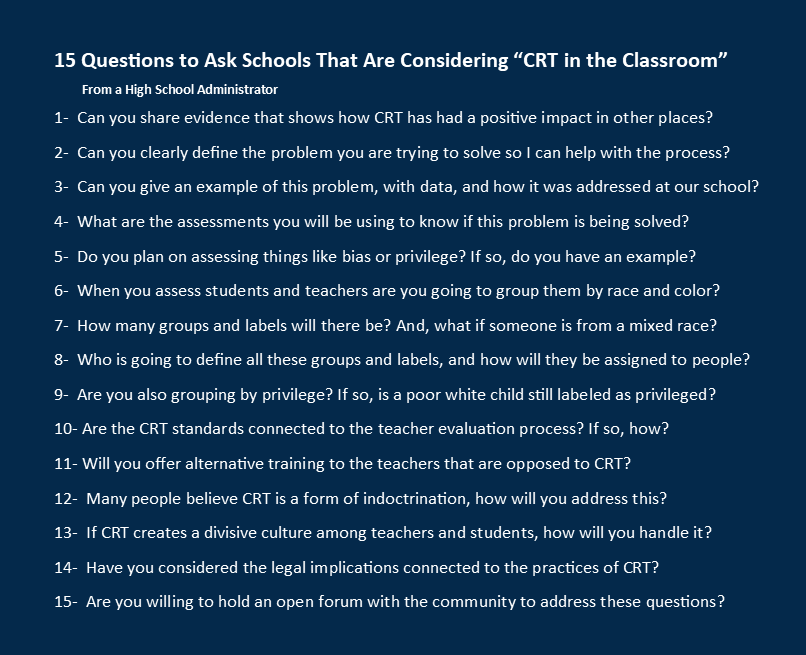For the most part, school board members may not respond to you during the public comment session in school board meetings. If you are wanting answers to your questions, you will need to write an email to the board as a whole, as well as to each individual member. You may also schedule an appointment to speak with your representative and/or your “At Large” representative. The “At Large” representative is the member that is responsible for all of the districts in your county. There is one “At Large” representative and there should be a member assigned to each district in your county.
Once you have the attention of the school board member(s) you need to make sure that you have done your homework on the issues you are about to discuss. Knowledge is power. Very often, you find that you know more than they do. You may find that the officials don’t really understand the implications of what they’re endorsing and promoting. This gives you a great opportunity to change the narrative with hard facts. If you still need answers that you can not get from the school board, don’t be afraid to contact your state’s department of education.
Don’t beat around the bush. Ask detailed questions that are very direct. Record the conversation if possible. Make sure that your state is a one-party consent state. That means that only one person has to know the conversation is being recorded. That person is YOU!
Below are questions written by our friends at Parents Defending Education that would be great to ask school board members in a public meeting with cameras rolling. Make sure you have someone there recording with their phone. Keep in mind that they can’t answer you, but it is good to get everything on the record.
If you have a question you think should be added to this list, please email it to us. And if you’ve asked tough questions of school officials and have video of the encounter, please contact us.
- Do you believe that people should be treated differently in our school based on the color of their skin? If an official answers in the affirmative, please contact us immediately.
- “Antiracism,” which you are promoting as official school policy, holds that all white people are racist and all institutions of society are racist. Do you consider yourself a racist? If so, what specific acts of racism have you committed? If you do not consider yourself a racist or cannot confess to specific acts of racism, can you explain why you are innocent of something everyone else is guilty of?
- You have announced that our school will now be an “antiracist” organization. Antiracism explicitly calls for discrimination on the basis of race. The leader of the antiracism movement, Ibram X. Kendi, writes that “the only remedy to past discrimination is present discrimination. The only remedy to present discrimination is future discrimination.” What specific racial discrimination policies are you adopting in order to become an “antiracist” school?
- You have grouped a number of new school policies under the concept of advancing “social justice.” Can you define, using specifics, what “social justice” means? Do you believe that people who disagree with the “social justice” policies you support are advocates of injustice?
- Since you have introduced a new curriculum that sees education through the lens of race, it would be helpful to understand how you define race. How exactly do you define someone as black, white, Latino, or Asian? Is someone with one black or Hispanic grandparent a “person of color”? What about one great-grandparent? What metrics do you use?
- Are all white people inherently more privileged than all black people regardless of individual circumstances? Is a white child who drops out of school and lives in poverty more privileged than a black child who attends an elite private school and has wealthy, successful parents?
- What do you think the eventual impact will be on children who will have spent years involved in activities teaching them that they are inherently bad – or disadvantaged – because of the color of their skin?
- You put out a statement on our [district/school]’s website [or social media account] stating that our school [or district] is systemically racist. What specific incidents led you to make this statement, and what actions were taken to remedy those incidents?
- Will you disclose publicly how much money our district and school are spending on new race, gender, and “social justice” initiatives? How much is being spent on teacher training programs, DEI consultants, and “audits” of the school? If you have hired someone to carry out an audit, will you release it to the public so parents and students can see it? If not, why not?
- How will these antiracist policies positively impact student achievement and test scores?
- How will these policies prepare younger students for rigorous academics in high school and high school student for rigorous studies in college?
- What evidence do you have to show that implementing these policies will increase our test scores across all grade levels? (For this one, it’s important to do some research on your school district’s current test scores as compared to other schools in the area.)






